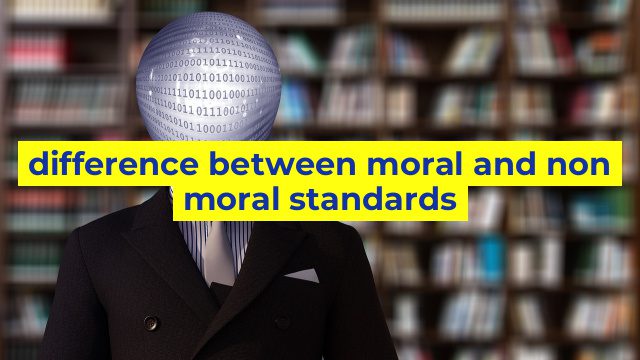The Difference Between Moral and Non-Moral Standards
Moral Standards
Moral standards are principles or rules of conduct that relate to what is right or wrong. These standards are based on a set of values that define what is acceptable behavior in society. Moral standards are typically closely linked to religious beliefs, cultural norms, and personal values. They are often shaped by socialization and upbringing.
One of the key characteristics of moral standards is that they are prescriptive – that is, they prescribe what we should do. Moral standards have a normative force, which means that they provide guidance on what is right or good. Some of the most common examples of moral standards include honesty, respect, fairness, and justice.
Non-Moral Standards
Non-moral standards, on the other hand, are principles or rules of conduct that do not relate to what is right or wrong. They are based on performance or effectiveness rather than on ethical considerations. Non-moral standards are often used in business, sports, or other areas where performance or results are of utmost importance.
Unlike moral standards, non-moral standards are not driven by social or cultural factors. Instead, they are often based on objective or measurable criteria, such as efficiency, productivity, or profitability. Examples of non-moral standards include efficiency, productivity, punctuality, and reliability.
The Importance of Understanding the Difference
It is important to understand the difference between moral and non-moral standards because they have different implications for our actions and decisions. Failure to recognize the distinction can lead to ethical lapses or misunderstandings in a variety of contexts, such as business, politics, or personal relationships.
While non-moral standards are focused on outcomes, moral standards are focused on values. In some cases, non-moral standards may conflict with moral standards, leading to difficult ethical choices. In these situations, it is important to prioritize moral standards over non-moral standards, even if it means sacrificing some level of efficiency or productivity.
In conclusion, understanding the difference between moral and non-moral standards is essential for making ethical decisions in a complex and ever-changing world. We must be aware of the different types of standards and how they apply to the situations we face in our daily lives. By doing so, we can ensure that our actions are consistent with our values and that we uphold our moral obligations.
Table difference between moral and non moral standards
| Moral Standards | Non-Moral Standards |
|---|---|
| Based on principles of right and wrong | Based on practical considerations and societal norms |
| Are universal and are expected to be followed by all individuals | Are subjective and depend on personal preferences and opinions |
| Are not always legally enforceable, but are expected to be followed voluntarily | Typically enforced by laws and regulations set by governing bodies |
| Can involve sacrifice and selflessness for the good of others | Do not necessarily involve personal sacrifice and can be self-serving |
| Often involve concepts such as fairness, honesty, and compassion | May involve concepts such as efficiency, productivity, and profitability |
